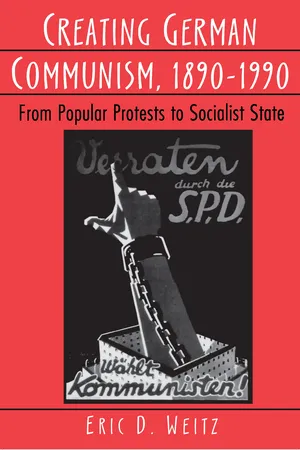
Creating German Communism, 1890-1990
From Popular Protests to Socialist State
- 472 pages
- English
- PDF
- Available on iOS & Android
About This Book
Eric Weitz presents a social and political history of German communism from its beginnings at the end of the nineteenth century to the collapse of the German Democratic Republic in 1990. In the first book in English or in German to explore this entire period, Weitz describes the emergence of the Communist Party of Germany (KPD) against the background of Imperial and Weimar Germany, and clearly explains how the legacy of these periods shaped the character of the GDR to the very end of its existence.In Weimar Germany, social democrats and Germany's old elites tried frantically to discipline a disordered society. Their strategies drove communists out of the workplace and into the streets, where the party gathered supporters in confrontations with the police, fascist organizations, and even socialists and employed workers. In the streets the party forged a politics of display and spectacle, which encouraged ideological pronouncements and harsh physical engagements rather than the mediation of practical political issues. Male physical prowess came to be venerated as the ultimate revolutionary quality. The KPD's gendered political culture then contributed to the intransigence that characterized the German Democratic Republic throughout its history. The communist leaders of the GDR remained imprisoned in policies forged in the Weimar Republic and became tragically removed from the desires and interests of their own populace.
Frequently asked questions
Information
Table of contents
- Cover Page
- Title Page
- Copyright Page
- Dedication
- Contents
- List of Illustrations
- List of Tables
- Acknowledgments
- List of Abbreviations
- Introduction
- Chapter 1: Regimes of Repression, Repertoires of Resistance
- Chapter 2: War and Revolution and the Genesis of German Communism
- Chapter 3: Reconstructing Order: State and Managerial Strategies in the Weimar Republic
- Chapter 4: Contesting Order: Communists in the Workplace
- Chapter 5: Contesting Order: Communists in the Streets
- Chapter 6: The Gendering of German Communism
- Chapter 7: Forging a Party Culture
- Chapter 8: The Anni terribili : Communists under Two Dictatorships
- Chapter 9: The Weimar Legacy and the Road to the DDR 1945-49
- Chapter 10: The Primacy of Politics: State and Society in the DDR
- Conclusion: The End of a Tradition
- Bibliography
- Index
- About the Author